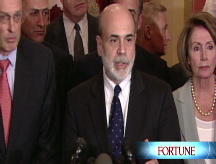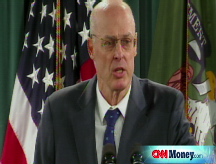How the U.S. could make money off the bailout
If taxpayers are taking on $700 billion of risk, why not give them a chance to take advantage of the rebound?
NEW YORK (Fortune) -- Members of Congress are now debating whether the government should demand equity stakes in any bank included in the proposed $700 billion bailout being pushed by Treasury Secretary Hank Paulson. If history is any guide, such a provision could recoup a big chunk of change for U.S. taxpayers.
As part of the post-9/11 airline bailout, Congress authorized up to $10 billion in loan guarantees for struggling airlines. Included in the law was an amendment - authored by then-Senators Jon Corzine (D-New Jersey) and Peter Fitzgerald (R-Illinois) - which instructed the Treasury Department's Air Transportation Stabilization Board to negotiate equity warrants - basically options to buy airline stock at below-market prices - from any airline getting the guaranteed loans. In order to avoid conflicts of interest, the government-owned shares were pegged as nonvoting shares.
As Fortune reported last year, the loans were repaid in full and the stock warrants that the government received netted the taxpayers $130 million from the sale of three airline stocks - America West, Frontier and World Airways. The most lucrative deal was a $429 million guaranteed loan to America West. The airline issued the ATSB a warrant to purchase 18.8 million shares, which represented a third of the company's common stock, and allowed the ATSB to buy it at $3 a share. By the time the ATSB cashed out, the stock was up to $9. (America West merged with US Airways in 2005.)
Fitzgerald, now chairman of one-year-old Chain Bridge Bank in McLean, Virginia, isn't wild about Paulson's bailout plan, but he does think that, as with the airline bailout, taxpayers should be compensated for their assistance. "If the taxpayers are taking the risk, then they should be able to participate in the upside when the bank returns to health," says Fitzgerald. "It would also deter healthy banks from using the fund as a dumping ground for bad assets."
As we wrote last year, the overall success of the Corzine-Fitzgerald amendment raises the question of why the federal and state governments don't routinely demand equity in exchange for aid to the private sector. For instance, if the National Institutes of Heath gives a $20 million grant for cancer research to a biotech startup, why shouldn't taxpayers be entitled to a small equity stake if that research winds up creating a windfall for the company's shareholders? Or if the owners of the Tampa Bay Rays want a new baseball stadium - one that will surely enhance the franchise's value - why shouldn't local taxpayers reap part of profit whenever the team is sold?
The 1979 Chrysler bailout included this type of equity kicker - one that eventually netted more than $300 million for the Treasury - but otherwise such provisions have been rare.
According to Fitzgerald, who left the Senate in 2005, the reason equity kickers aren't more common is simple: Corporate lobbyists won't let it happen. He says the only reason his and Corzine's provision passed was that airlines broke ranks. Bigger airlines that opted not to take loans didn't want smaller rivals gaining a government-funded edge without a penalty. "The airlines that intended to apply for the loan guarantees fought our amendment, but we prevailed because the airline industry as a whole was divided on the issue," says Fitzgerald. ![]()
-
 The retail giant tops the Fortune 500 for the second year in a row. Who else made the list? More
The retail giant tops the Fortune 500 for the second year in a row. Who else made the list? More -
 This group of companies is all about social networking to connect with their customers. More
This group of companies is all about social networking to connect with their customers. More -
 The fight over the cholesterol medication is keeping a generic version from hitting the market. More
The fight over the cholesterol medication is keeping a generic version from hitting the market. More -
 Bin Laden may be dead, but the terrorist group he led doesn't need his money. More
Bin Laden may be dead, but the terrorist group he led doesn't need his money. More -
 U.S. real estate might be a mess, but in other parts of the world, home prices are jumping. More
U.S. real estate might be a mess, but in other parts of the world, home prices are jumping. More -
 Libya's output is a fraction of global production, but it's crucial to the nation's economy. More
Libya's output is a fraction of global production, but it's crucial to the nation's economy. More -
 Once rates start to rise, things could get ugly fast for our neighbors to the north. More
Once rates start to rise, things could get ugly fast for our neighbors to the north. More









